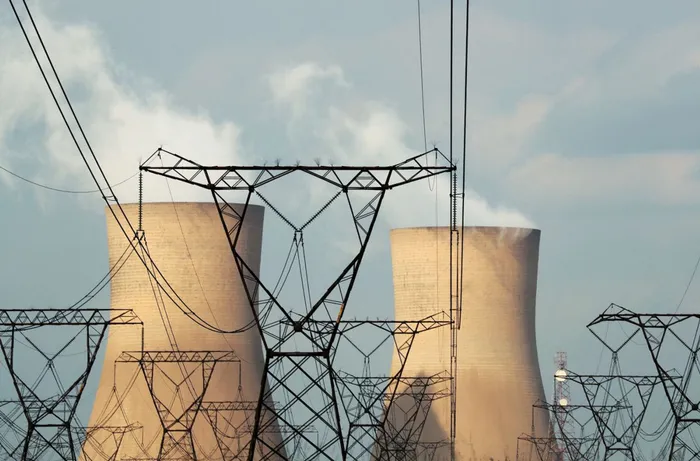
Cooling towers at an Eskom coal-based power station in Duhva. The AfDB funding, designed to bolster the country's transition to a low-carbon economy, is a vital component of South Africa’s ongoing efforts to enhance its energy landscape amidst pressing challenges.
Image: Mike Hutchings/Reuters
The African Development Bank (AfDB) Group has approved a $474.6 million (around R8.4 billion) loan earmarked for South Africa's Infrastructure Governance and Green Growth Programme (IGGGP).
This funding, designed to bolster the country's transition to a low-carbon economy, is a vital component of South Africa’s ongoing efforts to enhance its energy landscape amidst pressing challenges.
The IGGGP represents the second phase of the bank's strategic backing for a Just Energy Transition in South Africa, following the success of the earlier $300 million Energy Governance and Climate Resilience Programme, approved in 2023.
This prior initiative succeeded in reinforcing financial stability whilst expanding renewable energy capacity throughout the nation.
Structured around three crucial pillars—transforming energy security through power sector restructuring, promoting a low-carbon and just transition, and enhancing transport efficiency—the IGGGP is poised to catalyse South Africa's green transformation and drive inclusive, resilient growth.
Finance Minister Enoch Godongwana heralded the bank's assistance, emphasising the critical nature of this partnership.
“Our country faces the significant challenge of energy shortages, leading to loadshedding, as well as significant transport bottlenecks, which have been detrimental to growing our economy and achieving our developmental aspirations,” Godongwana said.
“With your partnership, our government has committed itself to stay the course and implement these critical reforms in the energy and transport sectors, while endeavoring to achieve our international commitments on climate change and our JET objectives.”
The IGGGP is not only about transforming the energy sector; it also focuses on fostering green industrialisation, creating jobs, and developing skills, specifically by supporting initiatives in electric vehicle manufacturing and green hydrogen production.
According to recent International Monetary Fund estimates, South Africa’s Just Energy Transition could enhance the country's GDP growth by between 0.2 and 0.4 percentage points annually from 2025 to 2030.
“This approval represents more than financing — it's a blueprint for Africa's energy future,” said Kennedy Mbekeani, AfDB’s director general for Southern Africa.
“South Africa's success in building a just, green, and inclusive energy system demonstrates that sustainable development and economic growth can go hand in hand.”
The financing package includes targeted grant components aimed at promoting energy efficiency initiatives and advancing rail sector reforms.
Key priorities will focus on accelerating vertical separation and establishing an investment framework designed to revitalise South Africa’s freight and logistics systems.
This, in turn, is expected to enhance the transport sector's competitiveness and foster regional integration, which is critical for economic growth across the Southern African Development Community.
As one of Africa's more advanced economies and a pivotal regional power, South Africa's triumph in its energy transition could inspire similar shifts continent-wide. Its experience in integrating renewable energy, modernising its grid, and implementing effective transition policies will prove invaluable for other African nations exploring sustainable development avenues.
Moreover, the initiative includes comprehensive environmental and social safeguards, with a pronounced emphasis on gender and youth empowerment.
Women are projected to constitute 70% of the beneficiaries of the expanded Social Employment Fund, while specialised youth skills programmes will prepare the younger generation for forthcoming opportunities in the burgeoning green economy.
The success of the IGGGP aligns with multiple United Nations Sustainable Development Goals, including affordable and clean energy (SDG 7), decent work and economic growth (SDG 8), industry, innovation, and infrastructure (SDG 9), and climate action (SDG 13).
This landmark financing from the AfDB is part of a robust international financing package amounting to $2.78bn, which includes $1.5bn from the World Bank, €500 million from Germany’s KfW, up to $200m from Japan’s JICA, and an anticipated $150m from the OPEC Fund.
Such coordinated funding exemplifies the global importance of South Africa's energy transition, particularly in light of its G20 presidency.
The programme is in line with the nation’s updated Nationally Determined Contributions under the Paris Agreement, which aim for greenhouse gas emissions reduction to between 398–510 million tons of CO₂ equivalent by 2025 and 350–420 million tons by 2030.
BUSINESS REPORT